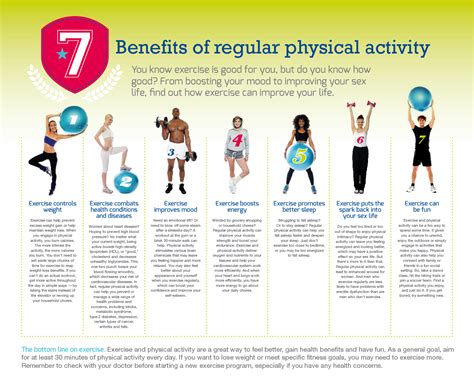When it comes to enhancing your overall well-being, incorporating regular physical activity into your daily routine is undeniably a wise decision. Engaging in a consistent exercise regimen allows you to take proactive steps towards maintaining a healthy and balanced lifestyle. Not only does physical activity contribute to your physical fitness, but it also plays a crucial role in your mental well-being.
Strengthening Your Body: By engaging in regular physical activity, you have the opportunity to fortify your body, making it stronger and more resilient. Whether it's through cardio exercises like walking or jogging, or strength training exercises like weightlifting, your muscles and cardiovascular system gradually become more efficient, allowing you to perform daily tasks with ease and reducing the risk of injury.
Nurturing Your Mind: Physical exercise doesn't just benefit your body, but it also has a profound impact on your mental health. When you engage in activities that get your heart pumping, endorphins are released in your body, which are often referred to as "feel-good" hormones. These endorphins are responsible for promoting a sense of happiness and relaxation, helping you combat stress, anxiety, and even depression.
Discovering Balance: Regular exercise provides you with the perfect opportunity to unplug from the chaos of daily life and connect with your inner self. It serves as a powerful outlet to release built-up tension and rejuvenate your mind, ultimately leading to improved focus, creativity, and a better sense of overall well-being. The physical and mental benefits of regular exercise create a harmonious balance that allows you to live your life to the fullest.
The Physical Advantages of Regular Physical Activity

Regular physical activity offers numerous benefits for the body, contributing to improved overall well-being and physical fitness. Engaging in regular exercise fosters various positive outcomes for the body's functioning and structure.
| 1. | Enhanced cardiovascular health: | Regular physical activity promotes a healthier cardiovascular system and improves overall heart function. It helps strengthen the heart muscles, regulates blood pressure, and assists in maintaining healthy cholesterol levels. |
| 2. | Weight management and muscle strength: | Consistent exercise aids in managing weight by burning calories and increasing muscle mass. It contributes to maintaining a healthy body weight and building strong muscles, resulting in improved physical performance and functionality. |
| 3. | Improved bone density: | Regular exercise, particularly weight-bearing activities such as running or weightlifting, stimulates bone formation and increases bone density. This helps in preventing osteoporosis and reducing the risk of fractures and bone-related ailments. |
| 4. | Enhanced flexibility and mobility: | Engaging in activities like stretching, yoga, or Pilates enhances flexibility and improves joint mobility. Regular exercise aids in maintaining a wide range of motion, preventing stiffness, and promoting overall physical agility and coordination. |
| 5. | Enhanced immune function: | Regular physical activity strengthens the immune system, making it more efficient in fighting off infections and diseases. It helps in reducing the risk of chronic illnesses, improving overall health and longevity. |
| 6. | Reduced risk of chronic diseases: | Consistent exercise lowers the risk of various ailments, including heart disease, type 2 diabetes, certain cancers, and metabolic syndrome. It contributes to maintaining optimal health and reducing the likelihood of developing chronic conditions. |
These are just a few examples of the physical benefits that regular exercise provides. By incorporating physical activity into your daily routine, you can experience improved physical health and well-being, leading to a happier and healthier lifestyle.
Improved Cardiovascular Health
Enhancing the condition of your heart and blood vessels can have a positive impact on your overall well-being. Engaging in regular physical activities, such as aerobic exercises and cardiovascular workouts, can lead to significant improvements in your heart health, blood circulation, and overall cardiovascular system.
Regular exercise can help strengthen your heart muscles and improve their efficiency, allowing your heart to pump blood more effectively throughout your body. This increased efficiency can decrease the risk of developing cardiovascular diseases, such as heart attacks and high blood pressure.
Furthermore, engaging in activities that elevate your heart rate on a regular basis can help to lower your resting heart rate over time. A lower resting heart rate signifies that your heart is functioning optimally and is associated with a reduced risk of heart problems.
Exercise also aids in maintaining healthy blood pressure levels. Regular physical activity helps to keep your blood vessels flexible and reduces the build-up of plaque on their walls, which can lead to hypertension. By keeping your blood pressure within normal ranges, you can decrease the likelihood of heart-related illnesses.
Moreover, participating in regular exercise can positively impact your cholesterol levels. Physical activity helps to increase your levels of HDL cholesterol (the "good" cholesterol) while decreasing levels of LDL cholesterol (the "bad" cholesterol"). This balance contributes to a healthier cardiovascular system and lowers the risk of heart disease.
| Regular exercise | Positive impact on heart health |
| Aerobic exercises | Improves cardiovascular system |
| Lower resting heart rate | Reduced risk of heart problems |
| Maintaining healthy blood pressure | Reduces risk of hypertension |
| Improved cholesterol levels | Lower risk of heart disease |
Weight management

In this section, we will explore the significance of maintaining a healthy weight as a result of engaging in regular physical activity. Effective weight management plays a crucial role in enhancing overall well-being and functionality, both mentally and physically.
Physical fitness: Engaging in regular exercise aids in weight management by increasing the body's energy expenditure. It helps to burn calories and build muscle mass, leading to a healthier weight. By incorporating activities such as cardio exercises, strength training, and flexibility exercises, individuals can achieve and maintain their desired weight.
Mental well-being: Alongside physical benefits, maintaining a healthy weight positively impacts mental health. Regular exercise releases endorphins, which are known as "feel-good" hormones, leading to reduced stress levels and improved mood. Achieving and managing a healthy weight can boost self-confidence and body image, fostering a positive mindset.
Chronic disease prevention: Maintaining a healthy weight through regular physical activity can significantly reduce the risk of developing chronic diseases. Conditions such as diabetes, heart disease, and certain types of cancer are more prevalent among individuals with excess body weight. Therefore, engaging in exercise to manage weight can be an effective preventive measure.
In conclusion, weight management is an essential aspect of maintaining overall physical and mental health. Regular exercise, coupled with a balanced diet, can aid in achieving and maintaining a healthy weight, leading to numerous benefits, including improved physical fitness, enhanced mental well-being, and reduced risk of chronic diseases.
Increased Bone Density
Enhancing the solidity and strength of one's skeletal framework is a noteworthy advantage associated with engaging in regular physical activity.
By partaking in consistent and appropriate exercise, individuals have the potential to augment the thickness and resilience of their bones, which can ultimately lead to improved bone density. This development in bone density can contribute to the mitigation of various skeletal ailments, such as osteoporosis, osteopenia, and fractures.
Regular exercise exerts mechanical stress on the bones, prompting them to adapt and become denser over time. This process involves the stimulation of specialized cells called osteoblasts, responsible for forming new bone tissue. As a result, bones become stronger and more resistant to injuries.
Furthermore, increased bone density positively affects overall posture and stability, reducing the risk of falls and related injuries. It can also play a vital role in supporting and maintaining healthy joint function, facilitating mobility and preventing conditions like arthritis.
In conclusion, incorporating regular exercise into one's lifestyle can yield the beneficial outcome of amplified bone density. By enhancing the density and durability of bones, individuals can safeguard against skeletal disorders, support better posture and stability, and promote overall joint health, resulting in a higher quality of life.
FAQ
Why is regular exercise important for physical health?
Regular exercise has numerous benefits for physical health. It helps to maintain a healthy weight, reduce the risk of chronic diseases such as heart disease and type 2 diabetes, strengthen bones and muscles, improve cardiovascular fitness, and boost the immune system. Additionally, regular exercise can enhance overall energy levels and improve sleep quality.
Can regular exercise improve mental health?
Yes, regular exercise can have a positive impact on mental health. Engaging in physical activity releases endorphins, which are known as "feel-good" hormones. This can help reduce symptoms of depression and anxiety, enhance mood, and promote overall well-being. Exercise also helps manage stress and improve cognitive function, including memory and concentration.
How often should I exercise to reap the benefits?
To experience the benefits of regular exercise, it is recommended to engage in moderate-intensity aerobic activity for at least 150 minutes per week, or vigorous-intensity aerobic activity for at least 75 minutes per week. Additionally, it is beneficial to incorporate muscle-strengthening activities at least two days a week. It's important to find a routine that suits your abilities and preferences, and gradually increase the duration and intensity of exercise over time.
What are some practical tips for incorporating regular exercise into a busy schedule?
Finding time for exercise can be challenging, but there are several practical tips to help incorporate it into a busy schedule. Firstly, prioritize exercise by scheduling it in your calendar and treating it as an important appointment. Consider integrating physical activity into your daily routine by taking the stairs instead of the elevator, walking or cycling to work, or doing quick workouts during lunch breaks. It can also be helpful to find activities you enjoy, as this increases the likelihood of sticking to an exercise routine.



